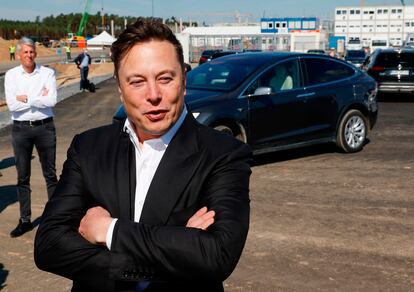Elon Musk accepts remote work... after employees put in 40 hours a week of face time
The founder and head of Tesla sent workers internal memos that were leaked on Twitter, whose own employees now fear they might soon face the same situation

Elon Musk has always been a pioneer. He founded PayPal, Tesla and Space X. Now, in post-pandemic times, he wants to innovate in matters of remote working. For him, this isn’t a substitution for working in the office, but a complement. He sees the two as compatible. For instance, he’ll accept employees connecting remotely if they’ve spent the previous day in the office.
Musk’s policy was leaked on Twitter, the company he is set to own. He reportedly sent the proposal to Tesla executives with the subject “Remote working is no longer acceptble” [sic]. Musk wrote that “Anyone who wishes to do remote work must be in the office for a minimum (and I mean *minimum*) of 40 hours per week or depart Tesla. This is less than we ask of factory workers.”
To avoid any misinterpretation, he further explained that the office “must be a main Tesla office, not a remote branch office unrelated to the job duties, for example, being responsible for Fremont factory human relations, but having your office be in another state.”
The message has been published by a technology website. Musk has not openly stated that he wrote the original message but has hinted that it was in response to a question from the website’s Twitter account which reads “Hey, Elon, a lot of people are talking about this leaked email. Any additional comment to people who think coming into work is an antiquated concept?” To which the businessman replied: “They should pretend to work somewhere else.”
They should pretend to work somewhere else
— Elon Musk (@elonmusk) June 1, 2022
Musk maintains that if there are “particularly exceptional contributors for whom this is impossible” he will personally review and approve those exceptions.
Bloomberg highlights the reference to Tesla factory workers, given the conditions at some of the electric carmaker’s plants, such as the one in Shanghai. According to the US agency, thousands of employees have been locked up for months, working 12-hour days, six days a week. Until recently, many slept on the premises to create a Covid-19 bubble, with day and nightshift workers using the same beds in makeshift dormitories.
This policy of face-to-face work coming from the richest man in the world could be a fiasco for Twitter employees, who already fear dismissal at the hands of the investor. The company reopened its San Francisco offices in late March, but CEO, Parag Agrawal gave all workers permission to work remotely, the option chosen by many. Combining the fear that Musk will move the company’s headquarters, as he did with Tesla, with his opposition to remote work, the outlook doesn’t look great for employees of the social network.
Musk’s methods are known and opposed to Twitter’s business culture. When Tesla struggled to meet production targets for its Model 3, Musk stayed overnight at the plant until the situation was under control, and immediately fired workers who couldn’t keep up with him.
It’s been said that Musk once threatened to fire all the interns for standing in a long queue for coffee at SpaceX, and installed cameras to make sure it didn’t happen again. There have been other emails sent to staff and leaked on social networks that feed the image of this authoritarian and visionary leader.
Recently, a scandal of a more serious nature has come to light. SpaceX paid $250,000 (€235,000) to a flight attendant to hush a sexual harassment complaint against Musk, according to Insider. Musk denied the accusations of sexual harassment, but not that the payment was made.
Tu suscripción se está usando en otro dispositivo
¿Quieres añadir otro usuario a tu suscripción?
Si continúas leyendo en este dispositivo, no se podrá leer en el otro.
FlechaTu suscripción se está usando en otro dispositivo y solo puedes acceder a EL PAÍS desde un dispositivo a la vez.
Si quieres compartir tu cuenta, cambia tu suscripción a la modalidad Premium, así podrás añadir otro usuario. Cada uno accederá con su propia cuenta de email, lo que os permitirá personalizar vuestra experiencia en EL PAÍS.
¿Tienes una suscripción de empresa? Accede aquí para contratar más cuentas.
En el caso de no saber quién está usando tu cuenta, te recomendamos cambiar tu contraseña aquí.
Si decides continuar compartiendo tu cuenta, este mensaje se mostrará en tu dispositivo y en el de la otra persona que está usando tu cuenta de forma indefinida, afectando a tu experiencia de lectura. Puedes consultar aquí los términos y condiciones de la suscripción digital.









































